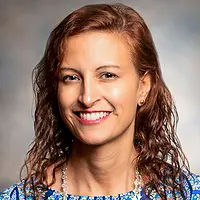This piece was written by Kristina Brunelle, Head of Global Equity, Diversity, Including and Belonging and shared with RTI staff. The opinions expressed in this piece are her own.
As a child, the only time I ever saw my father wearing a T-shirt was when he was mowing the lawn. Even then, it was actually his undershirt, revealed only after removing his Brooks Brothers button-down oxford, ironed and crisp. He carried a white cotton handkerchief (also ironed) everywhere he went and had a penchant for classical music and taking photographs with his Canon A-1 35 mm camera on the weekends.
Every weekday morning, he would walk the 15 minutes to the local train station to take the Metro-North line into Manhattan, where he spent the day as an Index editor for the New York Times. In the evenings, my mother would drive us in the family station wagon to pick him up and we’d head home for dinner, after which she would leave for her job as an English as a Second Language (ESL) professor at a local college.
My parents met at Columbia University in the 60’s. My father was at the School of Journalism, my mother at Teachers College. When they started dating, my mother’s family essentially stopped speaking to her. When my father called her at home during the summer, if my grandmother was the one to answer the phone, she would hang up on him.
They married in 1969. Only two years prior, in June of 1967, the U.S. Supreme Court voted unanimously that anti-miscegenation laws were unconstitutional under the 14th Amendment. If it weren’t for that decision, my brother and I might never have been born.
Growing up in a small town just north of Manhattan, we were one of only four Black/Mixed race families with children in the school system across a total population of about 13,000. At parties, people would say things to my father like “I don’t have a problem with Black people, I have Black friends” as an opening line over the buffet table. One summer, as we drove north for a family vacation, we stopped for a bite to eat at a restaurant where a waitress told my mother she could bring a menu and serve three of us a meal, “but not HIM.” As a teenager away at summer camp, one of my campmates, upon hearing that my father was Black, asked me “But don’t people burn crosses on your lawn?” After 9/11, my father began having to plan for a two-hour delay every time he went to the airport because he knew they would pull him out of the security line, sometimes to take him into another room and conduct a strip search. And I’ll never know what he did with the brick that was hurled through our dining room window with the N-word scrawled on it in black marker.
But my father is still here on this earth. He still listens to classical music and takes photos with his (now digital) camera everywhere he goes. He’s an avid reader, he likes to bake bread, he roots for the New York Mets. My brother and I are fortunate to have grown up with him in our lives. Fortunate that we never had to see him mentioned in a newsfeed, splashed across the television screen, on the front page of a local paper or in a YouTube video. Fortunate that (to our knowledge) he was never physically mistreated by anyone during our lifetime due to the color of his skin.
